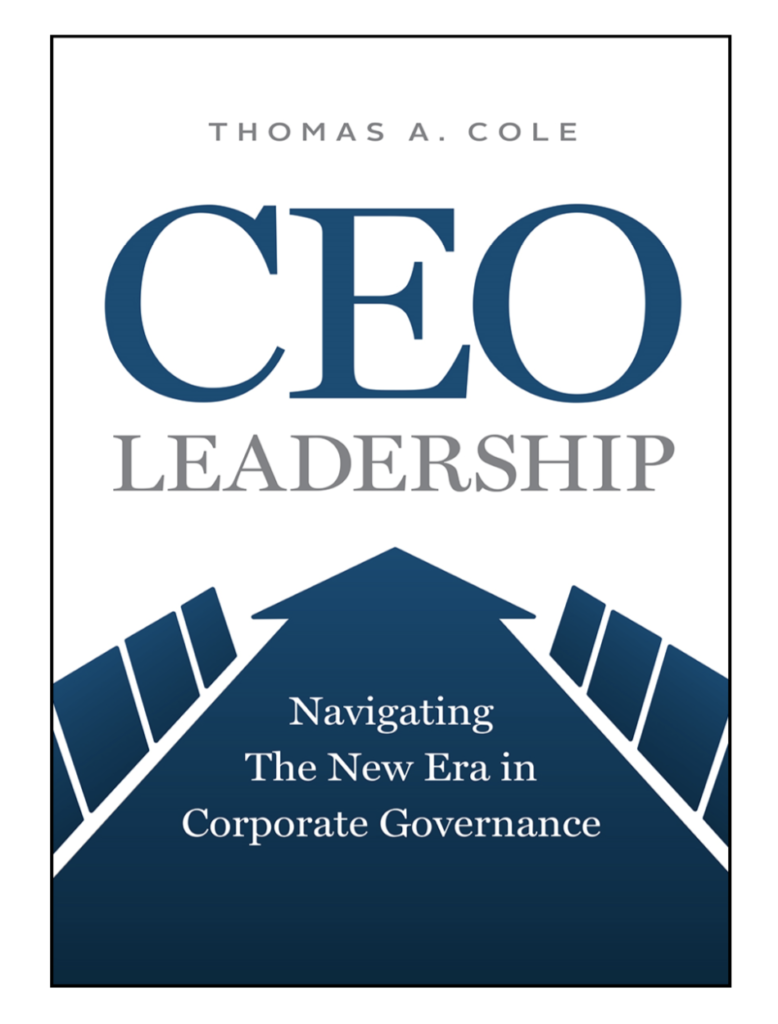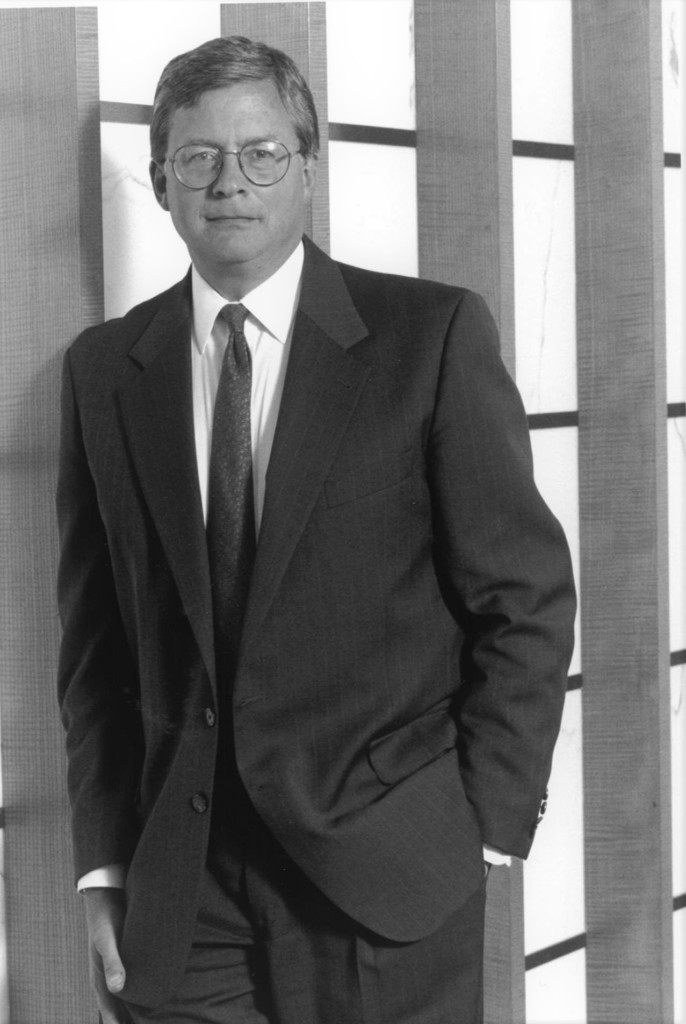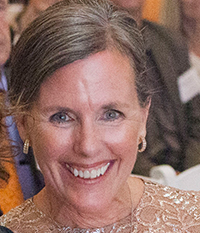Thomas A. Cole Has Spent a Career Advising Corporate Leaders and Boards—Now He’s Sharing His Expertise in a New Book: “CEO Leadership—Navigating the New Era in Corporate Governance.”
Thomas A. Cole has enjoyed three outstanding careers—as an M&A and corporate governance lawyer, as the chair of the executive committee of the Chicago-based and internationally acclaimed law firm Sidley Austin LLP, and as a corporate governance adjunct professor at the University of Chicago and Harvard Law Schools. He has also made time for civic engagement (he’s on the University of Chicago Board of Trustees and previously chaired the board of Northwestern Memorial Healthcare) and is a devoted husband, father of four daughters and a grandfather.
He possesses a rare combination of intellect, insight, common sense, and desire to serve—which surely propelled his career advising corporate leaders and boards. As an adjunct law professor, Cole developed a defining curriculum on “New Era” or 21st century corporate governance, which thoughtfully addresses issues related to Corporate Social Responsibility (CSR), Environment Social and Governance (ESG), impact Investing, activist shareholders and mercurial founders. He just published a book “CEO Leadership—Navigating The New Era in Corporate Governance,” (University of Chicago Press 2019), which encapsulates that curriculum and illustrates it with helpful anecdotes from his career.
Cole recently sat down with Better Founder Susan B. Noyes to discuss the book and the curriculum that guides it.

Susan B Noyes: How do you define the “New Era” of corporate governance? How does it differ from past eras of corporate governance?
Thomas A. Cole: The new era is the current period of board-centricity in critical corporate decision-making and significantly heightened expectations about board oversight of management teams.
The New Era started in the mid-1990s, when (among other things) institutional stock ownership eclipsed ownership by households. It really picked up steam in the early 2000s, following Congress’s response to the precipitous failure of Enron.
The New Era’s confluence of board-centricity and shareholder activism creates a risk that CEOs will be impeded in their ability to be true leaders focused on the long-term.
SBN: When did you start advising corporate leaders and boards, how has the work evolved since then?
TAC: For the longest time, senior partners in law firms played the role of consigliere to CEOs. I was given the opportunity to do so in the early 1980s at a relatively early stage of my career.
A major change for corporate lawyers came in the mid 1980s with the “in-house revolution,” so called after the title of a book by Ben Heineman, Jr., who led that revolution when he went to GE as Jack Welch’s general counsel. So now, a general counsel, rather than a senior partner is (or should be) the consigliere, and a savvy senior partner’s role is to help the general counsel.
Nevertheless, when the time comes for a sale of a company or another critical decision, the senior partner is often right there in the board room, helping to advise the CEO and the directors.

SBN: How do Corporate Social Responsibility and the investment lens known as “Environment, Social and Governance” (ESG) most appropriately guide the work of CEOs and corporate boards now?
TAC: Well-considered CSR and ESG can be a means of advancing the strategic priorities of the company. Actions in their name can be good for business and are legally supportable when they bear a rational relationship to long-term shareholder value.
For example, especially in a time of relatively full employment, it is a competitive advantage to have a well-deserved reputation for being a good place to work.
A note of caution, however: Companies that talk the talk by loudly promoting their CSR and ESG should be sure to walk the walk.
SBN: You quote Blackrock CEO Larry Fink as a leader in the corporate social responsibility space who says “to prosper over time, every company must not only deliver financial performance, but also show how it makes a positive contribution to society … [because] society is increasingly looking to companies, public and private to address pressing social and economic reforms.”
A more recent statement by the US Business Roundtable confirms this broader perspective on the stakeholders that corporations should serve. Which other corporate leaders do you admire for similar sensibilities?
TAC: The Business Roundtable statement is consistent with the notion that CSR/ESG can be good business and ultimately serve the long-term interests of the shareholders. Because I am personally interested in the need to address gun violence—whether mass shootings, inner city violence, suicides or even accidents—I admire the position taken by the CEO of Dick’s Sporting Goods. Similarly, even though guns are not part of the core business of Levi Strauss, I admire the company’s CEO for speaking out on the subject.
SBN: You touch on “investing with purpose,” which also has been referenced as “impact investing.” Please define what this means for publicly held corporations and how it should influence individual investors.
TAC: Public corporations are aware that there is a whole segment of institutional and individual investors who will be influenced by their track records on CSR/ESG. Even investors who do not have CSR/ESG as part of their express investment criteria may conclude that companies with a good track record on that score are a better bet, because they are better able to avoid or mitigate the impact of certain types of crises.
SBN: Isn’t this “New Era” dramatically different from the widespread belief that corporate pursuit of profits is fundamentally at odds with society prospering? How should businesses work to promote and disseminate this information?
TAC: Throughout the new era, until recently, the corporate mantra has been “maximize shareholder value.” Nevertheless, enlightened boards and managements have long understood that they could simultaneously pursue profits and undertake actions for the benefit of the so-called “other constituencies” which, in turn, benefit society. The companies that they lead often issue reports on their efforts in that regard. Positions such as those embodied in the Business Roundtable statement or the statement quoted above by Larry Fink help spread the word and will almost certainly lead other companies to follow suit.
One related point: The pursuit of profits for the benefit of shareholders has often led to an erroneous inference that the only duties that a corporate board and management have is to the shareholders. That is simply incorrect. While there is a generalized fiduciary duty only to the shareholders, each of the other constituencies is protected by myriad specific statutory, regulatory and contractual provisions. Companies that engage in CSR/ESG go beyond what is simply required by those provisions.
SBN: You address various ratings of the social good done by corporations, including the “B Corporation” designation and a rating by the Harvard Business Review. Are these helpful and should their influence, and perhaps number, grow?
TAC: One of the problems with these ratings is inconsistency. There are examples of two rating systems that give very different “grades” to the same company. So, I tend to discount their helpfulness.
In a similar fashion, I am more than a bit skeptical of ratings about corporate governance. The organizations that do those ratings are largely limited to observing certain objective and publicly available attributes. In my experience, to really understand how well a corporation is governed requires close observation of a CEO and his or her board and understanding how they interact. In short, a solid understanding of how good a corporation is on either ESR/ESG or corporate governance requires a careful, close-up look.
SBN: How could government be improved by adopting corporate governance best practices?
TAC: I would love to see the members of the House of Representatives and the Senate held to a fiduciary duty of care and to adopt corporate-like practices designed to help them fulfill that duty.
Imagine if every member were required to understand a bill and the analysis that supports that proposed legislation before voting on it!
Imagine if the proponents of legislation were required to provide the draft bill and supporting analysis to those on the other side of the aisle!
SBN: How is nonprofit board service similar to and different from corporate board service? What is the ideal for nonprofit board members?
TAC: In many ways, members of a not-for-profit board should conduct themselves no differently than those on a for-profit board. They should focus on strategy, succession, compensation and risk and carefully deliberate before making major decisions. And from my experience, they do! This is despite the fact that the risk profile of not-for-profit board service is so much lower—at least financial risk. Reputational risk is still present if the not-for-profit were to fail or suffer embarrassment (e.g., take contributions from “bad people” or have a senior executive caught up in a #metoo episode).
One of the biggest issues for a not-for-profit board derives from its typically large size. A very large board can experience “social loafing”—the tendency of one director or trustee to feel that someone else on the board is taking care of issues.
SBN: Anything else you want to tell us?
TAC: First, while it may seem counterintuitive, founders and other entrepreneurs (whether of for-profits or not-for-profits) can benefit from adopting many of the governance best practices of public companies. There will be some costs to do so, but done right, the benefits should far outweigh those costs.
Second, CEOs should focus on being leaders (not simply managers), and their boards should assess their ceos on that basis and assess themselves on how well they facilitate CEO leadership.
 Susan B. Noyes is the Founder & Chief Visionary Officer of Make It Better Media Group, which includes Better.
Susan B. Noyes is the Founder & Chief Visionary Officer of Make It Better Media Group, which includes Better.
A mother of six, former Sidley Austin labor lawyer and U.S. Congressional Aide, passionate philanthropist, and intuitive connector, she has served on boards for the Poetry Foundation, Harvard University Graduate School of Education Visiting Committee, American Red Cross, Lurie Children’s Hospital, Annenberg Challenge, Chicago Public Education Fund, Lyric Opera of Chicago, Chicago Symphony Orchestra, New Trier High School District 203, and her beloved Kenilworth Union Church. But most of all, she enjoys writing and serving others by creating virtuous circles that amplify social impact.

